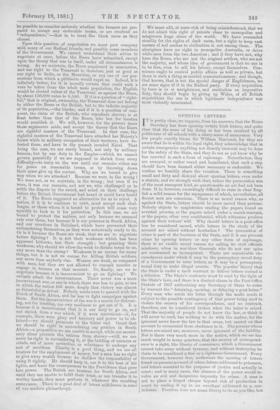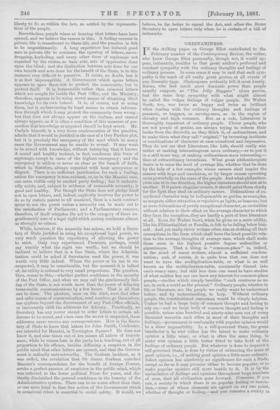OPENING LETTERS.
IT is pretty clear, we suppose, from his answers, that the Home Secretary has been opening certain Irish letters, and quite clear that the news of his doing so has been received by all politicians of all schools with a sharp sense of annoyance. Very few people exactly blame Sir William Harcourt, for they aro aware that he is within his legal right, they acknowledge that in certain emergencies anything not directly immoral may be done for the safety of the State, and, they do not as yet know why he has resorted to such a form of espionage. Nevertheless, they
arc annoyed, or rather vexed and humiliated, that such a step should have been deemed either necessary or endurable. We confess we heartily share the vexation. There is something small and dirty and disloyal about opening letters, even under a statute, and we strongly wish that, unless the provocation was of the most emergent kind, so questionable an act had not been done. It is, however, exceedingly difficult to state in deaf Eng- lish a solid reason for the repugnance of which, nevertheless, all decent men are conscious. There is no moral reason why, as against the State, letters should be more sacred than persons. Nobody objects to magistrates reading the papers found on arrested persons, or the papers seized under a search-warrant, or the papers, often very confidential, which witnesses produce against their writers' will. 'Why should letters in a post-office box be considered sacred, while letters in the study of the accused are seized without hesitation P The prevention of crime is part of the business of the State, and if it can prevent crime by opening letters or any other form of espionage, there is no visible moral reason for calling its civil officials misdoers, when in wax-time Generals who do not use spies are condemned as incompetent. There are conceivable cir- cumstances under which it may be the peremptory moral duty of a Government to seize letters, as it may be a peremptory moral duty to make illegal arrests. The popular' theory that the State is under a tacit contract to deliver letters unread is a delusion. The State's contracts must be read by the light of the State's laws, and there is a distinct clause in the Post-Office Statute of 1837 authorising any Secretary of State to order by warrant the "detaining, opening, or delaying a post-letter." Every man who sends his letter through the mails sends it subject to the possible contingency of that power being used to violate the secrecy of his correspondence, and no contract, therefore, can be considered broken when the letter is seized. That the majority of people do not know the law, or think it will never be used, has nothing to do with the matter, for the ignorant never know the law in that sense, but cannot on that account be exonerated from obedience to it. The persons whose letters are seized are, moreover, never ignorant of the liability. Nor is there very much more in the notion, which we see has much weight in many quarters, that the secrecy of correspond- ence is a right, like liberty of conscience, which a Government cannot take away without tyranny, and without destroying its claim to be considered a free or a righteous Government, Every Government, however free, authorises the opening of letters found on persons accused of crime, letters addressed to prisoners, and letters essential to the purposes of justice and actually in court ; and in many cases, the absence of the power would in- volve an evil and dangerous impunity for crime. A man is not to place a forged cheque beyond risk of production in court by sealing it up in an envelope addressed to a con- federate. Freedom does not mean liberty to do as you like, but liberty to do so within the law, as settled by the representa- tives of the people.
Nevertheless, people wince at hearing that letters have been opened, and we believe the reason is this. A feeling current in private life is transferred to State life, and the practice is felt to be ungentlemanly. A long experience has induced good men in private life to condemn the opening of letters, eaves- dropping, keyholing, and every other form of espionage not expected by the victim, as base" acts, acts of oppression done upon the blind ; and the distinction between acts done for our own benefit and acts done for the benefit of the State, is in this instance very difficult to preserve. It exists, no doubt, but it is at first imperceptible, A Government which opens letters appears to open them not to protect the community, but to protect itself. It is treasonable rather than criminal letters which are sought for inside the Post Office, and the Ministry, therefore, appears to be using secret means of obtaining illicit knowledge for its own behoof. It is, of course, not so using them, but is endeavouring by legal means to obtain informa- tion through which it may protect the community from wrong ; but that does not always appear on the surface, and cannot always appear, as it is often a condition of this measure of pre- caution that knowledge so.acquired should be kept secret. Mr. Carlyle himself, in a very fierce condemnation of the practice, admits that it would be justified in the case of a Guy Fawkes plot, but it is precisely the emergency of the need which in many eases the Government ma' be unable to reveal. It may want to be armed with knowledge, without betraying that it knows. A sound and healthy instinct, in fact, condemns this form of espionage, except in cases of the highest emergency ; and the emergency is seldom or never as clear as the breach of faith, which is, therefore, always regarded with keen annoyance or disgust. There is no sufficient justification for such a feeling, unless the emergency is non-existent, or, as in the Mazzini ease, can seem visible only to excited party feeling ; but it undoubt- edly exists, and, subject to evidence of reasonable necessity, is good and healthy. For though the State does not pledge itself not to open letters, and, indeed, explicitly reserves the power to do so by statute patent to all mankind, there is a tacit contract never to use the power unless a necessity can be made out to the satisfaction of Parliament; and a Parliamentary censure, therefore, of itself relegates the act to the category of those un- gentlemanly uses of a legal right which society condemns almost as strongly as crimes.
While, however, if the necessity has arisen, we hold a Secre- tary of State justified in using his exceptional legal power, we very much question the expediency of allowing the power to exist. Only very experienced Premiers, perhaps, could say exactly what the right was worth ; but we should be inclined to believe that in a free State, where the Adminis- tration could. be asked if Secretaries used. the power, it was worth very little iudeed. Where the power or its use is un- suspected, it may be considerable, but the moment it is talked of, its utility is reduced to very small proportions. The question, then, comes to this,—whether perfect confidence in the security of the Post Office, and what we may call the gentlemanly feel- ing of the State, is not worth more than the power of delaying treasonable communications by a few hours. That is all that can be done. The plotters, once on the alert, soon find other and safer means of communication, send couriers, go themselves, use cyphers beyond the discernment of any Post-Office officials, or incessantly shift the addresses for delivery, Practically, no Secretary has any power except to order letters to certain ad- dresses to be seized, and when once the secret is suspected, those addresses never receive any correspondence. How is the Secre- tary of State to know that letters for John Smith, Colchester, are intended for Mazzini, in Torrington Square P He does not know it, and nine times out of ten misses all letters of import- ance ; while he rouses hate in the party he is tracking, out of all proportion to his offence, besides diffusing a suspicion in the public mind that other letters are opened, and that the Govern- meat is radically untrustworthy. The Graham incident, as it was called, the revelation that Sir James Graham searched Mazzini's correspondence for the benefit of foreign Powers, awoke a perfect passion of suspicion in the public mind, which was reflected in the lower political Press for years, and dis- tinctly diminished the general confidence in the honesty of the Administrative system. There can be no worse effect than that, or one more fatal to that free action of the Government which in occasional crises is essential to social safety. It would, we believe, be far better to repeal the Act, and allow the Home Secretary to open letters only when he is certain of a bill of indemnity.



































 Previous page
Previous page